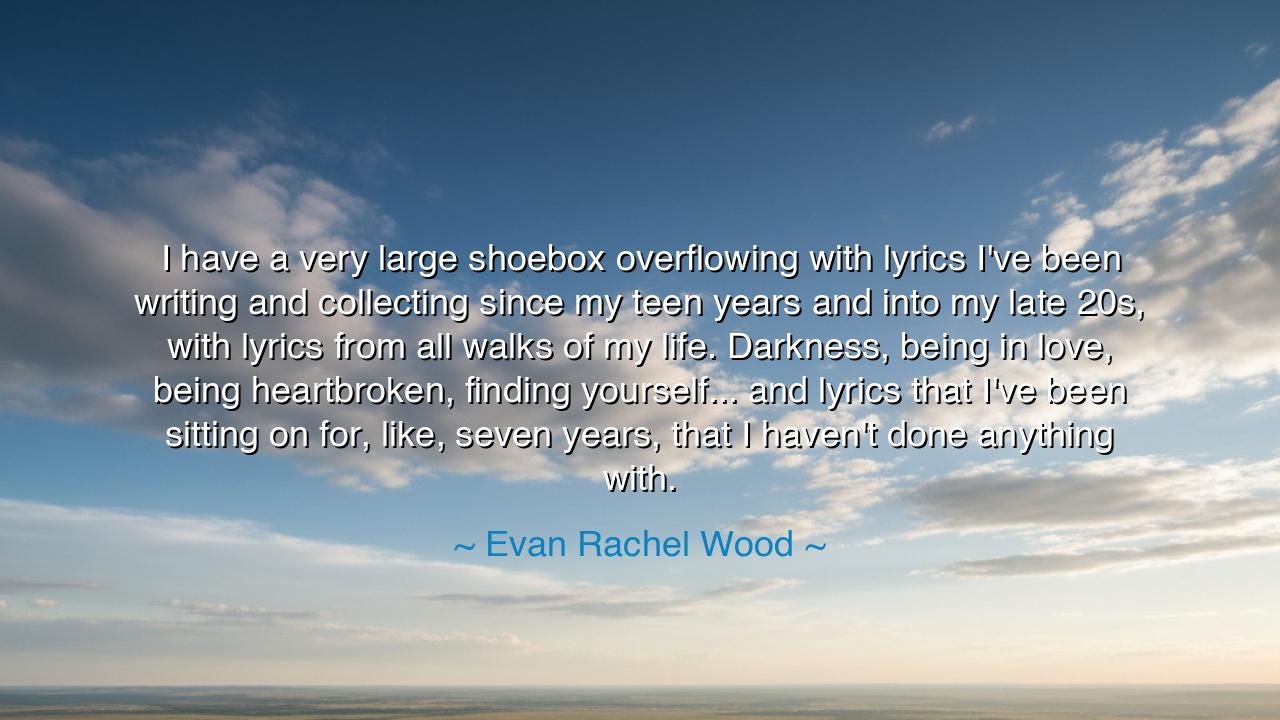
I have a very large shoebox overflowing with lyrics I've been
I have a very large shoebox overflowing with lyrics I've been writing and collecting since my teen years and into my late 20s, with lyrics from all walks of my life. Darkness, being in love, being heartbroken, finding yourself... and lyrics that I've been sitting on for, like, seven years, that I haven't done anything with.






Hear the voice of Evan Rachel Wood, who confessed with honesty and depth: “I have a very large shoebox overflowing with lyrics I’ve been writing and collecting since my teen years and into my late 20s, with lyrics from all walks of my life. Darkness, being in love, being heartbroken, finding yourself… and lyrics that I’ve been sitting on for, like, seven years, that I haven’t done anything with.” Though spoken softly, these words are a revelation about memory, creation, and the fragile treasures we keep hidden within us. For that shoebox is not just paper—it is the vessel of her soul, the archive of her journey.
The shoebox she names is a sacred chest, holding fragments of her being. Within it are verses born of darkness, words written when shadows pressed upon her spirit. There are also lyrics of love, radiant with tenderness and longing; lyrics of heartbreak, etched with the pain of loss; lyrics of discovery, reflecting the eternal search to know oneself. This overflowing box is more than storage—it is a map of her existence, each scrap of paper a footprint along the path of her life.
Her words remind us that not all creation is meant to be shared immediately. Some pieces sit in silence, waiting for their time, as she says of those lyrics untouched for seven years. This is the nature of art, and indeed of life: certain truths ripen slowly, certain songs must be lived before they can be sung. Just as a seed lies dormant before breaking the earth, so too can words rest in quiet for years before being given voice.
History shows us this same pattern. Consider Emily Dickinson, who wrote nearly two thousand poems in her lifetime but published only a handful while she lived. The rest she stored away in boxes and bundles, much like Wood’s shoebox of lyrics. To some, this might seem wasted potential; but in truth, it was the gathering of a soul’s essence, preserved until the world was ready—or perhaps until the poet herself was ready to let go. Dickinson’s hidden verses became immortal, proving that art, even when unseen, still holds power.
There is also humility in Wood’s confession. She does not parade her shoebox as a monument, but as a private testament to her inner world. It is a reminder that creation is first for the creator, a way to process, to survive, to understand. Whether or not those lyrics ever reach the stage, they have already served their sacred purpose: they have borne her grief, her love, her joy, her growth. To write is not always to publish; sometimes it is simply to breathe.
The lesson for us all is profound: guard your shoebox. Whatever form it takes—journals, sketches, recordings, letters—cherish the archive of your becoming. Do not despise what remains unfinished or unseen, for these are the reservoirs of your soul. When the time is right, some will emerge into the world, but even those that remain hidden are no less valuable. They are proof that you have lived, felt, and created.
So let Evan Rachel Wood’s words be passed down as teaching: create without fear, collect without shame, and treasure the fragments of yourself. Even if they remain in a shoebox for seven years or seventy, they are the record of your journey. Some may become songs for the world; others may remain whispers for your own heart. Both are sacred. For the shoebox of your life, overflowing with truth, is itself the greatest testament—that you dared to live deeply, to feel fully, and to preserve the song of your soul.






AAdministratorAdministrator
Welcome, honored guests. Please leave a comment, we will respond soon